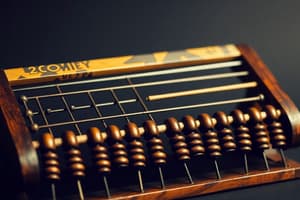Podcast
Questions and Answers
What was the primary component used in the first generation of computers?
What was the primary component used in the first generation of computers?
- Transistors
- Integrated Circuits
- Vacuum Tubes (correct)
- Microprocessors
Which programming languages emerged during the second generation of computers?
Which programming languages emerged during the second generation of computers?
- COBOL and FORTRAN (correct)
- C++ and Ruby
- HTML and CSS
- Python and Java
What technology characterized the third generation of computers?
What technology characterized the third generation of computers?
- Microprocessors
- Quantum Computing
- Integrated Circuits (correct)
- Vacuum Tubes
What was a significant outcome of the fourth generation of computers?
What was a significant outcome of the fourth generation of computers?
Which components are utilized in the fifth generation of computers?
Which components are utilized in the fifth generation of computers?
What are the key focuses of the fifth generation of computers?
What are the key focuses of the fifth generation of computers?
What was one effect of using Integrated Circuits in the third generation?
What was one effect of using Integrated Circuits in the third generation?
Which generation of computers is associated with the Intel 4004 and 8080 microprocessors?
Which generation of computers is associated with the Intel 4004 and 8080 microprocessors?
Which of the following describes the primary function of the abacus?
Which of the following describes the primary function of the abacus?
Who invented the mechanical calculator known as the Pascaline?
Who invented the mechanical calculator known as the Pascaline?
What was the significance of the Analytical Engine?
What was the significance of the Analytical Engine?
What type of data processing did Herman Hollerith's punch card machines primarily facilitate?
What type of data processing did Herman Hollerith's punch card machines primarily facilitate?
Which of these computers is recognized as the first general-purpose electronic digital computer?
Which of these computers is recognized as the first general-purpose electronic digital computer?
In what era were electromechanical computers predominantly used?
In what era were electromechanical computers predominantly used?
Which feature was NOT a capability of the Leibniz Wheel?
Which feature was NOT a capability of the Leibniz Wheel?
What advancement did the Difference Engine represent?
What advancement did the Difference Engine represent?
Flashcards are hidden until you start studying
Study Notes
History of Computers
- Evolution of computers has progressively simplified calculations through various machines and technologies.
- The transition from manual calculation tools to electronic computers marks a significant milestone in technological advancement.
Machines Designed to Simplify Calculations
- Abacus (circa 2000 BCE): One of the earliest calculation tools, consisting of beads on rods; used in ancient civilizations for basic arithmetic.
- Mechanical Calculators (1600s - 1800s):
- Pascaline (1642): Created by Blaise Pascal, designed for addition and subtraction.
- Leibniz Wheel (1673): Invented by Gottfried Wilhelm Leibniz, capable of multiplication, division, and square root calculations.
- Difference Engine (1822): Designed by Charles Babbage for tabulating polynomial functions; an early step toward automated computation.
- Analytical Engine (1837): Babbage's concept of a general-purpose computer; programmable using punched cards; unfinished but foundational for modern computing.
- Punch Card Machines (1890s): Developed by Herman Hollerith for processing U.S. Census data; utilized patterns of holes in cards for efficient data manipulation.
- Electromechanical Computers (1930s):
- Zuse Z3 (1941): First programmable computer, created by Konrad Zuse.
- Harvard Mark I (1944): An electromechanical computer utilized for military calculations during WWII.
- Electronic Computers (1940s - 1950s):
- ENIAC (1945): First general-purpose electronic digital computer, operating with vacuum tubes for rapid calculations.
Components and Generations of Computers
-
First Generation (1940s - 1950s):
- Components: Vacuum Tubes.
- Characteristics: Large, expensive, heat-producing machines; example: ENIAC.
-
Second Generation (1950s - 1960s):
- Components: Transistors.
- Characteristics: Smaller, faster, more cost-effective computers; introduction of programming languages like COBOL and FORTRAN.
-
Third Generation (1960s - 1970s):
- Components: Integrated Circuits (ICs).
- Characteristics: Enabled miniaturization and increased computing power; witnessed the start of multiprogramming.
-
Fourth Generation (1970s - present):
- Components: Microprocessors.
- Characteristics: Single-chip CPUs revolutionized personal computing; notable examples include Intel's 4004 and 8080 microprocessors.
-
Fifth Generation (Present and Beyond):
- Components: Very Large Scale Integration (VLSI) and Ultra Large Scale Integration (ULSI).
- Characteristics: Packing millions/billions of transistors onto chips; focus on powerful, compact devices and advances in artificial intelligence and quantum computing.
Studying That Suits You
Use AI to generate personalized quizzes and flashcards to suit your learning preferences.




